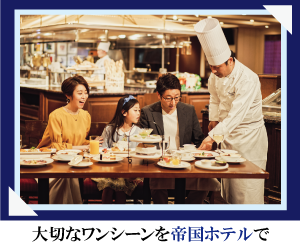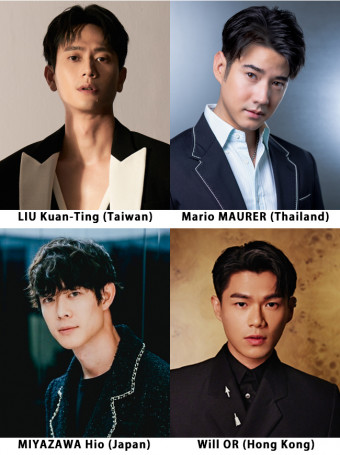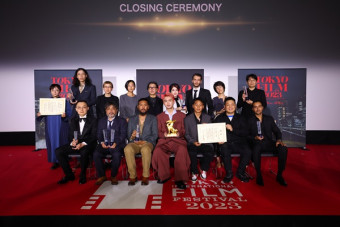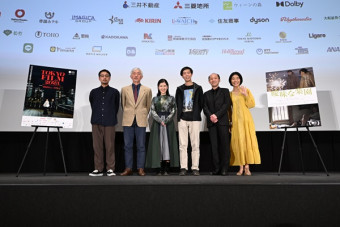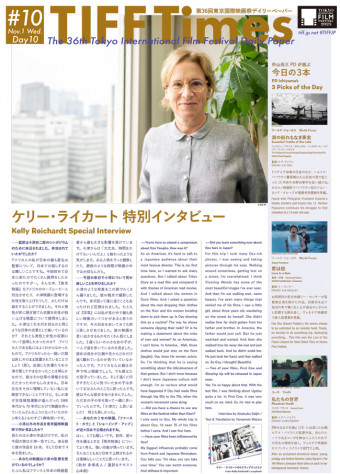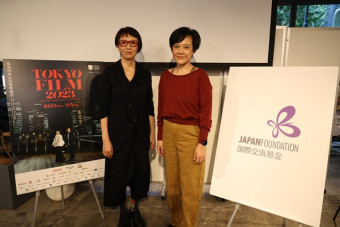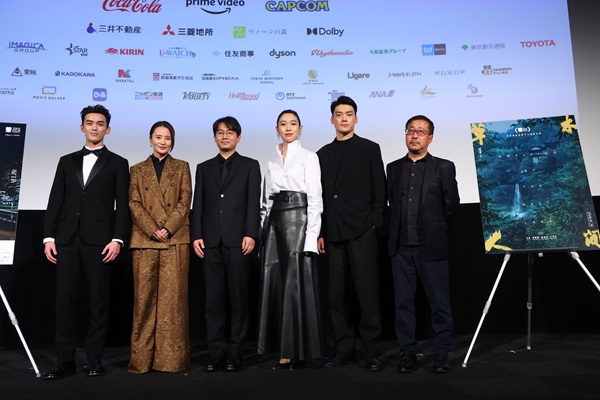
Dwelling by the West Lake, the hotly anticipated sophomore feature from young Chinese auteur Gu Xiaogang, whose debut had taken the film world by storm in 2019, enjoyed its world premiere in Competition at the 36th Tokyo International Film Festival on October 28. At the post-screening Q&A session, the writer-director, smiling happily at the packed audience, was joined on stage by actors Wu Lei, Jiang Qinqin, Wang Jiajia, Yan Nan and Wang Hongwei. Gu also introduced and thanked members of the crew who were in the audience, including the editor, the cameraman and the Japanese composer, Umebayashi Shigeru.
The session was moderated by TIFF Programming Director Ichiyama Shozo, who began by asking about the meaning of the film’s original Chinese title, Cao Mu Ren Jian.
Said Gu, “On the poster, you see the characters for ‘grass’ and ‘tree’ and then two characters meaning ‘the world.’ So together they mean something akin to ‘living among the grass and the trees.’ Grass, trees and tea are interrelated, with tea being made from the leaves of the tea plants in the film.
“The characters that form the name ‘Mulian,’ the film’s protagonist, are also types of flowers, so all of these are inspired by flora. I believe that humans are born to have a life similar to that of plants. How you go on your destined journey is up to you, but if you make a strenuous effort, you can find a way to define your own path and take charge of your own fate.”
Ichiyama noted that Gu’s first film, Dwelling in the Fuchun Mountains, had starred mostly amateur actors, whereas he hired professionals for this new work. And while the story is again about family, he said, the focus of Dwelling by the West Lake is “the dark side of humans, especially greed.” One of the reasons that TIFF had invited the film to premiere in Tokyo—and will also be honoring the director with the festival’s Kurosawa Akira Award at a ceremony on October 31—is that Gu had demonstrated such a dramatic shift in focus.
“The theme and the style are completely different,” concurred the director. “I wanted to focus on the pyramid scheme at the center of the story. I’ve had some relatives who were involved in such a scheme, and in trying to depict it in my film, they were very helpful and gave me a lot of information about it. The more you explore it, the more you realize that this type of thing happens everywhere. So I wanted to delve more deeply into it.”
He continued, “How I was going to tell the story was the challenge, because it was so different from my previous film, which is something I intentionally set out to do. I wanted to depict the natural landscape but also the dark side of society. I had many choices for how to do that, but I wanted to show exactly how the schemes were taking place, how they recruited, how people who were struggling could find hope through them. I used professional actors this time because I thought it would be easier for the audience to understand the story, and to really comprehend what the pyramid scheme is all about.”
The director also explained that he had been inspired by “a folkloric tale in China about a son trying to save his mother from going to hell. Hell in this case is the pyramid scheme, and Mulian is trying to rescue her from it.”
Dwelling by the West Lake does not initially make such intentions clear. It opens with a swooningly beautiful view, from the sky, of tea workers in the early light of dawn, surrounding endless terraced rows of tea plants as they awaken the mountain guardians from their winter slumber to ask for a good harvest. “Sprout! Sprout! Sprout!” they yell by the hundreds, as the camera swoops over the rows of green and out to the West Lake in Hangzhou, Zhejiang Province. The celebrated lake has attracted poets and artists for centuries, and its timeless scenery continues to draw visitors, even as its shiny modern high rises gleam nearby.
But the tea workers dwell instead on the mountains, living together in makeshift lodgings as they dream of a better life in the big city, so close but so far away. One of the new workers is Wu Taihua (Jiang Qinqin), who has come to this famous tea-growing area to be closer to her son He Mulian (Wu Lei of hit TV drama “Battle Through the Heavens”) as he completes college and begins job hunting. Although Mulian refuses to believe his father has died, he had abandoned the family a decade earlier and has not been in touch. Mulian has been carrying on a covert search for him, and finds evidence that he did not forget his son.
Taihua has been covert in her own way, carrying on with a wealthy, widowed tea master whose mother refuses to allow him to remarry. Following an unpleasant altercation at work, Taihua decides to go with her friend to a glitzy recruiting party for Butterfly International, which sells herbal foot patches but calls itself “the path to wealth.” The company’s “economy sharing model” anticipates accusations that it is actually promoting a pyramid scheme, but the appeal is too much for Taihua to resist. She longs to be confident and independent, to be powerful businesswoman, “the woman she was always meant to be,” and she seizes the opportunity with the proceeds from the sale of the family home in another province.
Soon, Mulian no longer recognizes his mother. Although there’s certainly an upside to her newfound “happiness,” he knows that the illegal scheme is also sure to be her undoing, and he makes a desperate bid to stop the scammers before it’s too late for his mother.
Gu’s second film, like his first, examines the contrasts between traditional and modern China, between the beauty of its natural landscapes and the ugliness of its synthetic, consumer-oriented spaces.
The actress playing Taihua, Jiang Qinqin, was asked how she’d become involved in the project. “I saw Mr. Gu’s first film, which was so beautiful, and I was very moved by it. So when he made this offer to me, I was very happy and I said yes right away. I read the script and was very excited that I’d been given this opportunity to play such a role. People living in between grass and trees, hoping they can reach heaven. This was the first time I’ve played such an eccentric role, so it was really challenging for me. I had to show parts of myself that I don’t usually show. I tried to immerse myself in the role and do the best I could.”
Popular star Wu Lei, her onscreen son, nodded. “I feel the same. I loved Gu Xiaogang’s first film very much. I was touched to have the opportunity to work on this film. I wanted to act in it, but I was hesitant because I wasn’t sure if I could handle such an important role. But with Gu’s encouragement, I decided to say yes and did my best.”
Q&A Session: Competition
Dwelling by the West Lake
Guests: Gu Xiaogang (Director/Screenplay), Wu Lei (Actor), Jiang Qinqin (Actor), Wang Jiajia (Actor), Yan Nan (Actor), Wang Hongwei (Actor)



















